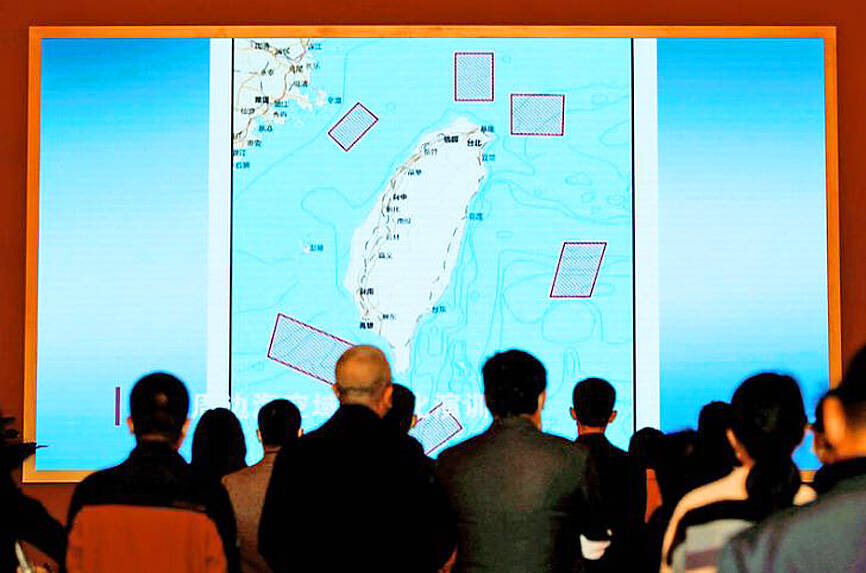China attempting to blockade Taiwan would be a mistake for Beijing, as US-led coalition forces would be able to circumvent it, a former US Department of Defense official said on Friday.
Former US Department of Defense senior director for China, Taiwan and Mongolia Tony Hu (胡振東) said in a media interview that the perception that China could cause Taiwan to collapse by blockading it for three weeks did not reflect reality.
“First, they can’t blockade Taiwan for three weeks,” Hu said in response to a question of how coalition forces would react if Chinese warships and planes surrounded Taiwan to prevent foreign military assistance.

Photo: Reuters
If China conducted a blockade without firing weapons it would still be an act of war under international law and “coalition forces could conduct anti-blockade operations by escorting supplies into Taiwan,” he said.
It would also not make sense for Beijing to use the tactic if its goal is to take Taiwan, he said.
“China hopes to take Taiwan in a quick victory,” and “a blockade is not going to give them a quick victory,” Hu said.
“If China does a blockade, it would give coalition forces so much time to build up and to move forces forward that the chance of them ever winning a conflict with Taiwan would be nil,” he said.
Hu also said that the current lack of joint military exercises between Taiwan and the US is a “hindrance” for Taiwan in preparing for a potential conflict in the Taiwan Strait.
He said he hoped that this would soon change, given provisions passed by the US Congress last year and in 2021 that called for Taiwan-US joint military training.
Even without joint exercises, Taiwan’s military is moving in the right direction by pursuing a joint C4ISR (command, control, communications, computers, intelligence, surveillance and reconnaissance) platform that is also used by the US military, which would improve the interoperability between the two forces and facilitate joint training, Hu said.
On countering China’s “gray zone” activities — an extension of the Chinese military short of outright military engagement that includes Chinese maritime militias harassing the Japan Coast Guard and chasing Philippine fishing boats away from their fishing grounds — he called for world governments to define who should be considered “combatants” and who should be considered “noncombatants,” a line that China has deliberately blurred.
For example, entities operating under the command of a semi-military organization such as the China Coast Guard should be classified as combatants and responded to accordingly, he said.
Chinese civilian hackers commissioned by Beijing to attack other countries’ financial systems or Internet infrastructure should be regarded and dealt with as combatants, he added.
The world needs to redefine the gray areas that China has been exploiting to gain an advantage over the rest of the world, including the information warfare that it is waging by planting disinformation in the media of other countries, he said.

Taiwanese can file complaints with the Tourism Administration to report travel agencies if their activities caused termination of a person’s citizenship, Mainland Affairs Council Minister Chiu Chui-cheng (邱垂正) said yesterday, after a podcaster highlighted a case in which a person’s citizenship was canceled for receiving a single-use Chinese passport to enter Russia. The council is aware of incidents in which people who signed up through Chinese travel agencies for tours of Russia were told they could obtain Russian visas and fast-track border clearance, Chiu told reporters on the sidelines of an event in Taipei. However, the travel agencies actually applied

Japanese footwear brand Onitsuka Tiger today issued a public apology and said it has suspended an employee amid allegations that the staff member discriminated against a Vietnamese customer at its Taipei 101 store. Posting on the social media platform Threads yesterday, a user said that an employee at the store said that “those shoes are very expensive” when her friend, who is a migrant worker from Vietnam, asked for assistance. The employee then ignored her until she asked again, to which she replied: "We don't have a size 37." The post had amassed nearly 26,000 likes and 916 comments as of this

New measures aimed at making Taiwan more attractive to foreign professionals came into effect this month, the National Development Council said yesterday. Among the changes, international students at Taiwanese universities would be able to work in Taiwan without a work permit in the two years after they graduate, explainer materials provided by the council said. In addition, foreign nationals who graduated from one of the world’s top 200 universities within the past five years can also apply for a two-year open work permit. Previously, those graduates would have needed to apply for a work permit using point-based criteria or have a Taiwanese company

The Shilin District Prosecutors’ Office yesterday indicted two Taiwanese and issued a wanted notice for Pete Liu (劉作虎), founder of Shenzhen-based smartphone manufacturer OnePlus Technology Co (萬普拉斯科技), for allegedly contravening the Act Governing Relations Between the People of the Taiwan Area and the Mainland Area (臺灣地區與大陸地區人民關係條例) by poaching 70 engineers in Taiwan. Liu allegedly traveled to Taiwan at the end of 2014 and met with a Taiwanese man surnamed Lin (林) to discuss establishing a mobile software research and development (R&D) team in Taiwan, prosecutors said. Without approval from the government, Lin, following Liu’s instructions, recruited more than 70 software